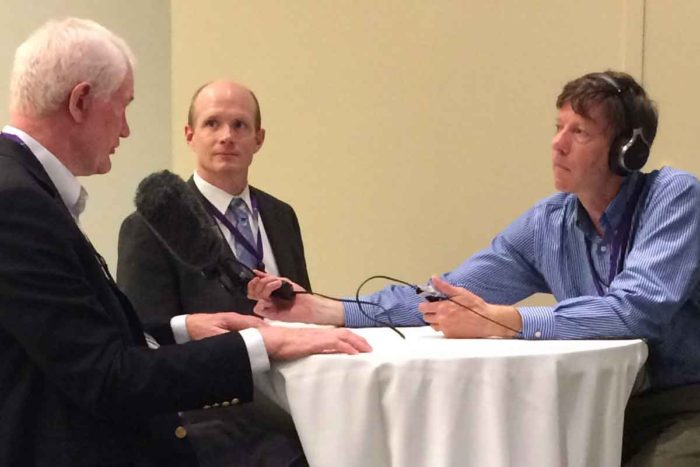University to host Alan Alda ‘Communicating Science’ workshops
Symposium Sept. 26-29 aimed at helping scientists share news of their work
 Judy Martin Finch
Judy Martin FinchJon Hamilton (right), a science reporter for National Public Radio, interviews John C. Morris, MD, (left) director of the Alzheimer’s Disease Research Center at Washington University, and Randall J. Bateman, MD, the Charles F. and Joanne Knight Distinguished Professor of Neurology, about their Alzheimer's research.
Science is intimately connected to the world we live in, and it is crucial for scientists to be able to share news of their work effectively with people outside of their specific disciplines, not just those with laboratory know-how.
To help toward that end, the university will host a four-day symposium Sept. 26-29 called “Communicating Science 2016.” The event will be held at the Eric P. Newman Education Center on the Medical Campus.
“As scientists, we need to effectively communicate our work to lots of different people, many of them non-scientists, but that’s not as easy as it might sound,” said Jennifer K. Lodge, PhD, vice chancellor for research for Washington University. “The better we are at explaining our science, the less a mystery it becomes. We do incredibly valuable things that people need to know about and support, particularly as researchers struggle for public support and funding for their work. This symposium will help many work toward presenting their research in an interesting, digestible, relatable way.”
While some sessions will be limited to 32 faculty members and trainees who applied to participate in workshops led by instructors from the Alan Alda Center for Communicating Science at Stony Brook University, a plenary session led by the Alan Alda Center’s James Rea will be open to any interested university students, faculty and staff.
The plenary session, from 8:30 to 9:30 a.m. Tuesday, Sept. 27, will be interactive and will focus on general principles in how to craft short, clear, conversational statements to lay audiences about what scientists do and why it matters. Participants will practice clarity in speaking to nonscientists about their work and may be tapped for improvisation exercises or to explain scientific material to lay people. Registration is recommended for the plenary session.
The Alan Alda Center is dedicated to helping scientists more effectively communicate with the public, research funders, policymakers and fellow scientists. Rea is a communications coach and consultant who specializes in helping scientists, engineers and other technical experts reach key audiences with clear, engaging stories. Before joining the Alan Alda Center, he worked in a communications role with the U.S. EPA’s Design for the Environment Program; as an independent reporter and producer for National Public Radio; and he ran his own communications consulting practice.
In addition to the plenary session, faculty and trainees are invited to register for presentations and workshops led by Washington University speakers. Some of these sessions are nearly full, but registration information and other details are listed on the Washington University Sessions page.
“In the face of decreasing financial support, fierce competition for funding and public skepticism about basic science research, helping everyone understand the value and benefits of scientific research has never been more important,” said Paul Schoening, associate dean and director of the Bernard Becker Medical Library. Schoening and Sandra Matteucci, director of the School of Engineering & Applied Science Communication Center, worked with Lodge to organize the symposium.
“The Communicating Science Symposium is an opportunity for our scientists to develop skills at connecting with any audience to share their stories in ways that draw their audiences into a better understanding and appreciation of their research,” Schoening continued. “We are very fortunate to have many talented experts to draw upon for this symposium within the university, as well as the highly respected team from the Alan Alda Center for Communicating Science. Our research community has made it clear to us that this is important, and we’re excited to be working with the vice chancellor and others to bring this together.”
Schoening said campus response to the symposium has been so overwhelmingly positive that the organizers plan to investigate ways to offer similar types of programs in the future.






